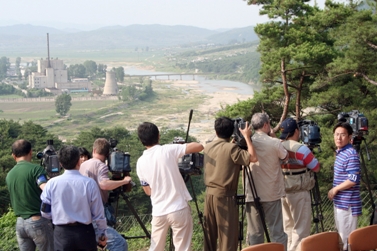North Korea's nuclear weapon and missile tests have opened a new chapter in the long-running story of the rogue state's relations with its neighbours and the wider world.
 |
| The media splash of the destruction of Yongbyon's cooling towers seems a long time ago now (Image: PA) |
That program followed a landmark 2007 commitment from North Korea to the other of the Six Parties (China, Japan, Russia, South Korea and the USA) to abandon "all nuclear weapons and existing nuclear programs." Since then the international community was able to verify the disablement of several key nuclear weapons facilities including the Yongbyon reactor that has produced the country's weapons plutonium, which had its cooling towers demolished. In return North Korea gained significant energy and food assistance and was removed from the USA's list of state sponsors of terrorism. The mood then cooled somewhat with international inspections curtailed, North Korean threats to restart Yongbyon, and now this destabilising test of a weapon and its potential delivery method.
The country's second nuclear weapons test on 25 May was conducted underground like the first, but proved to be more successful. The blast of October 2006 was estimated at under 1 kiloton, whereas the latest was put at around 20 kilotons - comparable in power to the bombs that struck Hiroshima and Nagasaki at the end of World War II and enough to confirm North Korea as a nuclear weapons state. It was followed by a test of short range missiles in a further provocation.
Like previous missile launches this year, the acts are a complete violation of UN Security Council demands made after the 2006 test which required North Korea to refrain from any nuclear or missile tests as well as to rejoin the Nuclear non-Proliferation Treaty and abandon its programs for weapons of mass destruction. The Security Council was called to an emergency session on the afternoon of the tests and joined to condemn them. The body is considering further resolutions and possibly further sanctions, but it is unclear how sanctions could harm a country already so poor and isolated.
North Korea's moves may have been intended to put pressure on US President Barack Obama, whose administration is yet to tackle North Korea. Obama said: "By acting in blatant defiance of the UN Security Council, North Korea is directly and recklessly challenging the international community... Such provocations will only serve to deepen North Korea's isolation. It will not find international acceptance unless it abandons its pursuit of weapons of mass destruction and their means of delivery."
North Korea has developed its nuclear capabilities independently of any nuclear power programs. Its Yongbyon reactor has only token power-generating equipment and was run on short refuelling cycles to maximise the amount of plutonium-239 that could be recovered through reprocessing. It is also thought to have a centrifuge program to produce high-enriched uranium, also suitable for a certain type of atomic weapon, but North Korea has never confirmed this. In the past, nuclear power plants without weapons potential have been offered to North Korea as an incentive to cease weapons activity and although the program has been disbanded, revival would be possible should this be required.






_15863.jpg)







